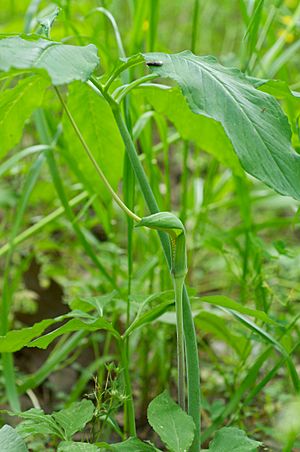Dragon-root facts for kids
Quick facts for kids Dragon-root |
|
|---|---|
 |
|
| Conservation status | |
| Scientific classification |
|
| Kingdom: | Plantae |
| Clade: | Tracheophytes |
| Clade: | Angiosperms |
| Clade: | Monocots |
| Order: | Alismatales |
| Family: | Araceae |
| Genus: | Arisaema |
| Species: |
A. dracontium
|
| Binomial name | |
| Arisaema dracontium |
|
| Script error: The function "autoWithCaption" does not exist. | |
Script error: No such module "Check for conflicting parameters".
The Green Dragon plant, also known as Arisaema dracontium, is a unique plant found in North America. It grows from a round, underground stem called a corm. You can find it in damp, wooded areas from Quebec in Canada, all the way south to Florida and Texas in the United States. It also grows in parts of northeastern Mexico.
When it blooms, the plant is about 20 to 50 centimeters (8 to 20 inches) tall. After it flowers, it can grow even taller, up to 100 centimeters (about 3 feet). Each plant usually has one large leaf. This leaf has a long stem and is made up of 7 to 13 smaller leaflets. The leaflet in the middle is the biggest, and the others get smaller as they spread out. These leaflets usually sit flat, like a table.
In the spring, the Green Dragon plant produces a single, slender, green flower part called a spathe. This spathe is about 3 to 6 centimeters (1 to 2.5 inches) long. Inside it, there's a long, thin structure called a spadix. The spadix looks a bit like a tail and sticks out from the top of the spathe.
After the plant flowers, it produces a cluster of up to 150 berries. These berries grow in a shape that looks like a club. In late summer, the berries change color from green to a bright orange-red. Each berry contains 1 to 3 seeds. In Canada, the Green Dragon plant is considered a vulnerable species, meaning it needs protection.
Contents
What is a Green Dragon Plant?
The Green Dragon plant is a type of Arisaema plant. It belongs to the plant family called Araceae. These plants are known for their unique flower structures, which often have a hood-like spathe covering a central spadix.
Where Does the Green Dragon Plant Grow?
The Green Dragon plant prefers to grow in places that are a bit wet. You can often find it in damp forests, along stream banks, or in swampy areas. It likes the shade provided by trees. Its wide range across North America shows it can adapt to different climates, as long as it has enough moisture.
How is the Green Dragon Plant Related to Other Plants?
Within the Arisaema group, the Green Dragon plant (A. dracontium) is closely related to a Mexican plant called A. macrophyllum. Sometimes, people even thought A. macrophyllum was a type of Green Dragon plant. Other plants in this same group are found in places like East Asia and India.
It's interesting to know that the Green Dragon plant is not closely related to another well-known American Arisaema plant, the Jack-in-the-Pulpit. Even though they are both in the Arisaema family, they belong to different main groups within it.
Is the Green Dragon Plant Safe to Eat?
No, the Green Dragon plant is not safe to eat raw. Like the Jack-in-the-Pulpit, its underground stem (corm) can cause a strong burning feeling if you try to eat it raw. It's best to just admire these plants in nature and not try to taste them.
 | Selma Burke |
 | Pauline Powell Burns |
 | Frederick J. Brown |
 | Robert Blackburn |


